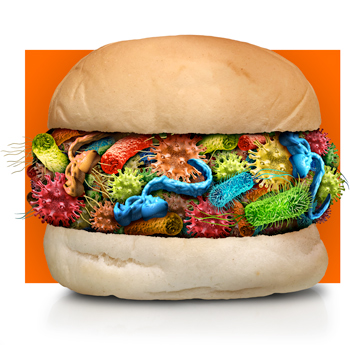
Lately, stories of listeria outbreaks and related recalls have dominated the news. What exactly is listeria and how can you protect yourself from infection? If you have been injured by food contamination contact a personal injury attorney to find out about your legal rights.
What Is Listeria?
Listeriosis is the infection caused by the bacterium listeria monocytogenes. Unlike many other foodborne diseases, listeria primarily affects older adults, pregnant women, newborns, and adults with weakened immune systems. However, this is not an exclusive list.
How Do I Get It?
Listeriosis is contracted by eating food contaminated with listeria monocytogenes. Most healthy persons may eat or drink contaminated foods without becoming infected. However, high-risk groups are susceptible to infection. A pregnant woman who eats contaminated food can pass it along to her unborn baby.
When listeria contaminates a food processing factory, it can live there for years, sometimes contaminating food products. Listeria has been found in a variety of raw foods, such as uncooked meats and vegetables, as well as in foods that become contaminated after cooking or processing, such as soft cheeses, processed meats like hot dogs and deli meat, and smoked seafood. Unlike most bacteria, listeria can grow and multiply in some foods in the refrigerator.
How Do I Know If I’ve Been Infected With Listeria?
Symptoms vary from person to person, but if you are infected you can expect fever and muscle aches, sometimes preceded by diarrhea or other gastrointestinal symptoms. Almost everyone diagnosed with listeriosis has an “invasive” infection, in which the bacteria have spread beyond the gastrointestinal tract.
If you develop fever and chills while pregnant or if you are very sick with fever and muscle aches or a stiff neck, consult your doctor immediately. A blood or spinal fluid test will show if you have listeriosis.
How Can I Prevent Infection?
As with all foodborne illnesses, persons at risk can prevent listeriosis by avoiding certain high-risk foods and by handling and storing food properly. Listeria is killed by pasteurization and cooking; however, in some ready-to-eat foods, such as hot dogs and deli meats, contamination may occur after factory cooking but before packaging. These steps can help avoid listeria contamination:
Keep your kitchen and environment cleaner and safer.
- Wash hands, knives, countertops, and cutting boards after handling and preparing uncooked foods.
- Clean up all spills in your refrigerator right away–especially juices from hot dog and lunchmeat packages, raw meat, and raw poultry.
Prepare foods properly.
- Thoroughly cook raw food from animal sources, such as beef, pork, or poultry to a safe internal temperature.
- Rinse raw produce, such as fruits and vegetables, thoroughly under running tap water before eating, cutting, or cooking. Even if the produce will be peeled, it should still be washed first.
Store foods safely.
- Separate uncooked meats and poultry from vegetables, cooked foods, and ready-to-eat foods.
- Use precooked or ready-to-eat food as soon as you can. Do not store the product in the refrigerator beyond the use-by date; follow USDA refrigerator storage time guidelines:
- Hot Dogs – store opened package no longer than 1 week and unopened package no longer than 2 weeks in the refrigerator.
- Luncheon and Deli Meat – store factory-sealed, unopened package no longer than 2 weeks. Store opened packages and meat sliced at a local deli no longer than 3 to 5 days in the refrigerator.
- Divide leftovers into shallow containers to promote rapid, even cooling. Cover with airtight lids or enclose in plastic wrap or aluminum foil. Use leftovers within 3 to 4 days.
- Be aware that listeria monocytogenes can grow in foods in the refrigerator. The refrigerator should be 40°F or lower and the freezer 0°F or lower.
How is Listeriosis Treated?
Listeriosis is treated with antibiotics. If a person has eaten food contaminated with listeria and does not have any symptoms, most experts believe that no tests or treatment are needed, even for persons at high risk for listeriosis.
If I’ve Been Infected, What Should I Do?
I have represented victims of listeria contamination, including those affected by Sara Lee Corporation’s 1998 recall of over 40 million pounds of Ball Park Hot Dogs and Sara Lee brand deli meat because of listeria contamination. In that matter, over 21 people died as a result of listeriosis.
Since then, I have continued to represent food poisoning victims. I understand that this is a serious matter and deserves serious attention, particularly if the illness involved hospitalization, loss of work or the death of a loved one. If you’d like to speak to an attorney about listeria contamination, contact my office.
RELATED POSTS
“Food Poisoning” or Something Else? How to Tell
Salmonella. You’ve Heard of It, Now Learn About It
